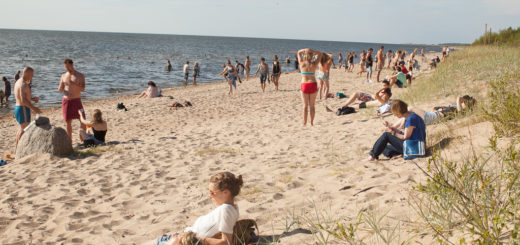At least Iceland’s rich in talent
It’s not often that you get a chance to sit down with rock stars from Iceland for a long chat about economics. But at South By Southwest, anything can happen.
Iceland’s economy suffered a devastating collapse in October, leaving the country bankrupt. The value of the currency plummeted. Iceland’s population is 300,000, and 7,000 of them were in the streets rioting. The government collapsed.That was the backdrop for my chats with some Icelandic musicians.
Steed Lord is a four-piece electronic music band that’s demonstrated its assemblage of danceable beats, vocal distortions, English lyrics and fabulous stage-wear in venues worldwide.
Steed Lord is a family business. The three men in the group are brothers, while Kali and brother M.E.G.A. have been a couple for 15 years. She used to baby-sit brother Demo, who’s on keyboards.
Steed Lord is often touring, and the band members isn’t immune from their country’s economic turmoil.
“It was horrible from October to December,” M.E.G.A. said. He explained that the crashing currency meant that they briefly couldn’t get cash from foreign ATMs. In Russia, they paid the equivalent of $250 to eat hamburgers and sodas in a TGI Friday’s.
Then M.E.G.A. surprised me by asking what people thought of his country — he was wondering if people viewed Iceland as a punch line . I told them that my impression was that Americans saw Iceland as the first domino that fell in the economic collapse.
In contrast to the electronic sound of Steed Lord, Sprengjuhollin (a.k.a. Exploding Palace) is an indie-pop group whose perky sound and enthusiasm would fit right in at the Austin City Limits Music Festival. If the “Austin sound” has an Icelandic cousin, it is Sprengjuhollin.
The five-person group (Atli, Berg, Siggi, Georg and Snorri) managed to sell 8,000 copies of its first album. That’s impressive in a country where selling 5,000 copies means a gold record. The band got to SXSW by selling enough downloads on eMusic to pay for the trip. Though the band usually sings in Icelandic, it had an English-language set for SXSW.
Before the economic collapse, the group often played at elaborate corporate events, including some for the banking sector. They played one event where a sports stadium was turned into an elaborate version of Venice. The group joked that some people might see them as part of the economic problem because of the money spent paying them to play these events.
As the group discussed what things were like in Iceland, I felt like I was sitting in an Iceland-focused episode of “Meet the Press.” That may be because several of Sprengjuhollin have day jobs in the press. Berg is a lawyer who writes a weekly newspaper column. Atli just got a job doing PR for a publishing house. The group’s manager, Jon, owns a weekly paper. Georg, the bass player, used to work as a financial journalist before losing his job in December.
“We had so many positive things to write about. Suddenly all we had was bad news,” Georg said.
The economic crises had at least one silver lining for Sprengjuhollin.
After we spent an hour talking about the Icelandic economy over drinks and snacks, I picked up the tab, figuring I could expense it under “Icelandic economic bailout.”























